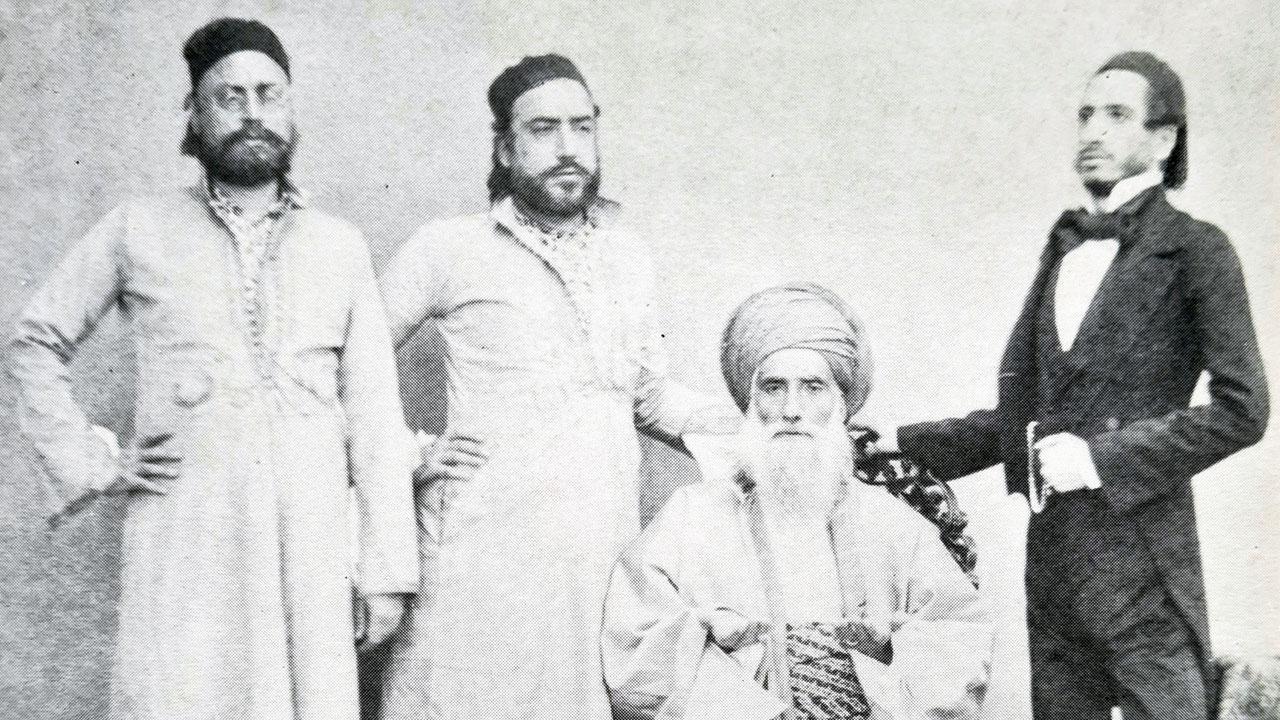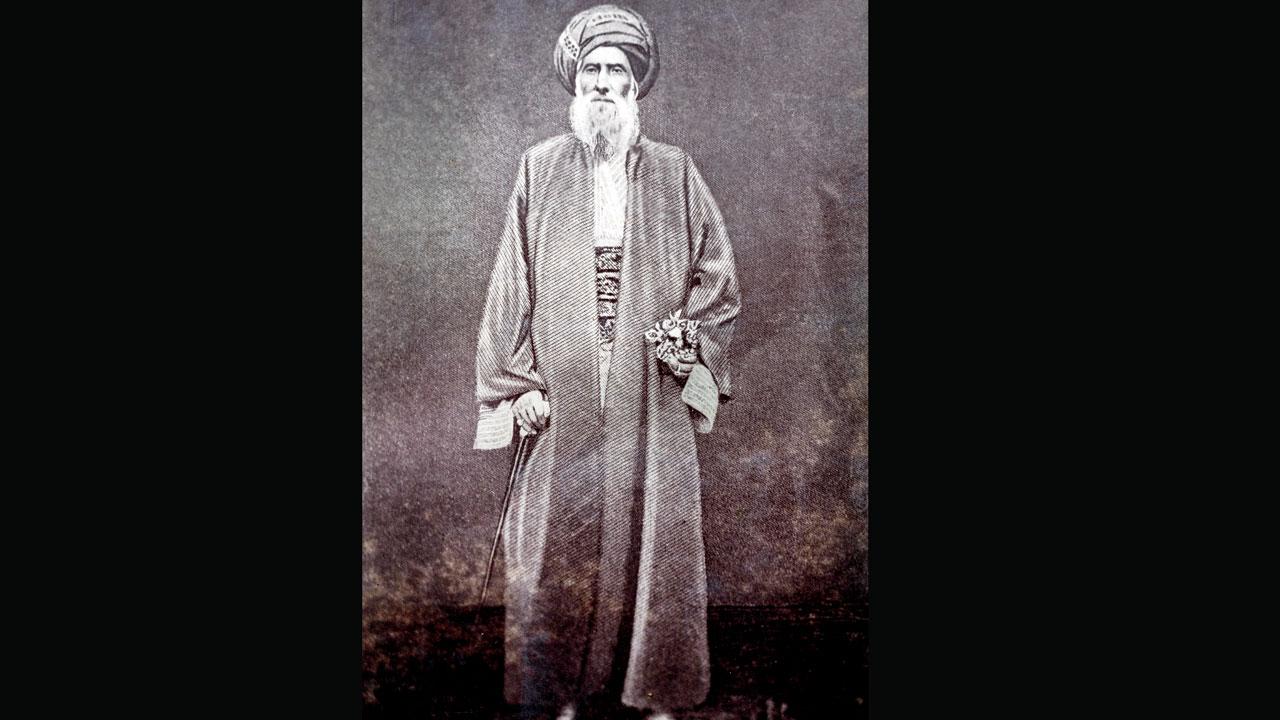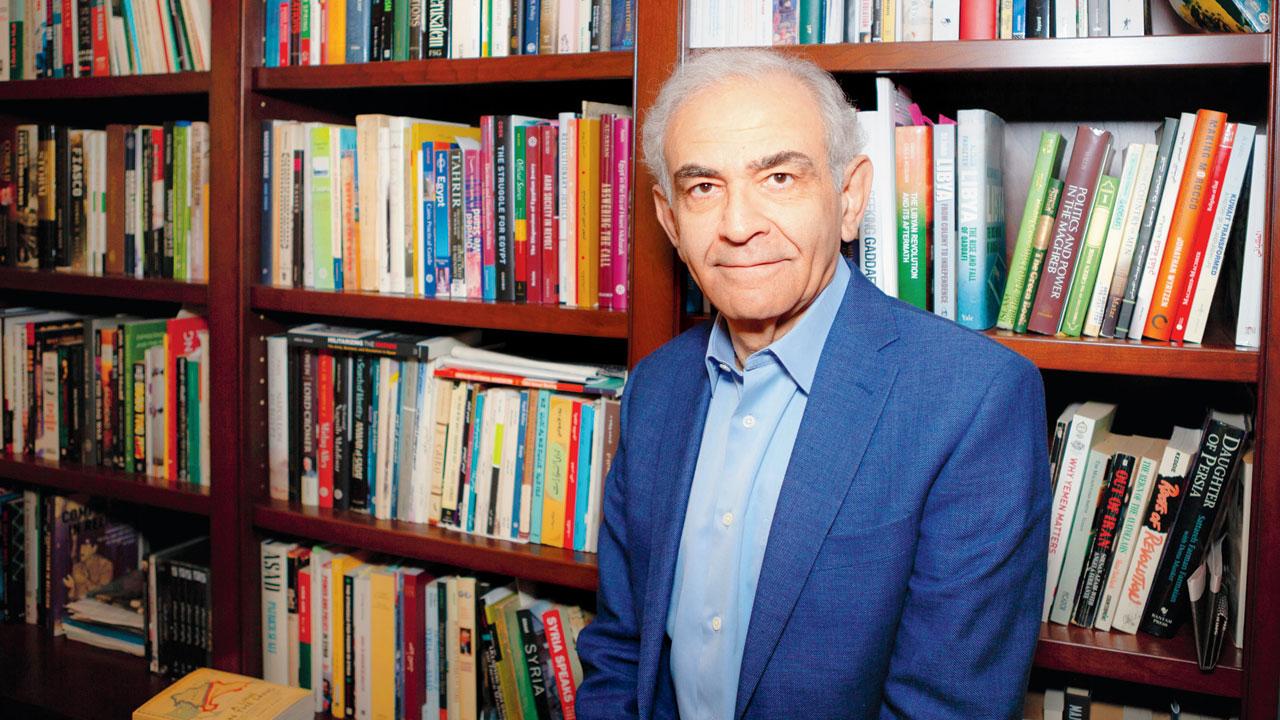A descendent of the Sassoons has authored a new book that offers an intimate portrait of the Jewish business family whose fortunes were scripted by its patriarch in this port city unfamiliar to him

David with his three eldest sons, (left to right) Elias, Abdallah and Sassoon David (SD), distinguished from his brothers in Western dress. Pics Courtesy/The Global Merchants: The Enterprise and Extravagance of the Sassoon Dynasty
It's almost impossible sometimes to create a portrait of a person, whose life story has been written and retold differently throughout history. Author Joseph Sassoon, a professor of history and political economy and director of the Center for Contemporary Arab Studies at Georgetown University, experienced a similar challenge, when researching the story of David Sassoon, one of the most prominent merchants and philanthropists from 19th century Bombay, who hailed from the Baghdadi Jewish community. One theory claimed that David Sassoon and his father Sheikh Sassoon ben Saleh Sassoon, the former chief treasurer of Baghdad, fled from Baghdad for Bushir in Iran due to the fear of the plague and floods. David’s own grandson, Edward Sassoon MP, in a lecture given in late 1907, erroneously said that David was “chief treasurer”, and “fled the scene”, perhaps because he was “too honest in his dealings with the Pashas” due to which “energetic measures were being hatched against him”. There were other anti-Semitic theories that were floated as well, with one publication in London claiming it was
because of a pogrom.
ADVERTISEMENT
These theories disturbed Joseph no end. “The claim that they fled because of the cholera [outbreak] didn’t make any sense, because it’s impossible that a father would take only one son [David] with him and leave his other children behind. Same is with the pogrom theory. Why did nothing happen to any of David’s other brothers and sisters [in Baghdad]? In fact, I am a descendent of one of them,” he says in a telephone interview.
 David Sassoon and his young family moved to Bombay, shortly after his father Sheikh Sassoon ben Saleh Sassoon, the former chief treasurer of Baghdad, died in 1830
David Sassoon and his young family moved to Bombay, shortly after his father Sheikh Sassoon ben Saleh Sassoon, the former chief treasurer of Baghdad, died in 1830
Joseph’s new book, The Global Merchants: The Enterprise and Extravagance of the Sassoon Dynasty (Allen Lane, Penguin UK), is a first-of-its-kind attempt to present an intimate history of the Sassoons, who were one of the great business dynasties of the 19th century. Drawing from vast family archives, as well as historical material, Joseph examines why the Sassoons left Baghdad and made Bombay their home, and how they expanded their business network from London to Shanghai. “When I went through the material at the Ottoman Archives, it came out very clearly that the governor of the time [a Mamluk named Dawud], was very corrupt, arresting people left, right and centre, asking for a ransom for his own little army that he was setting up against the Sultan. [It made sense for David to leave].”
But then why did David choose Bombay, when he “could have opted for Isfahan, Persia’s largest trading centre, or followed other Baghdadi Jews to Bahrain to take advantage of the burgeoning flow of goods between the Gulf and India”? It’s something that struck the author as interesting. “He [definitely] took far more risks in going to a country that he knew nothing about. He may have become curious about the place, when he networked in the souqs [of Bushir]. But his interest in India really began in Baghdad itself, when he met a British representative—more like a commercial attaché—who worked in Bombay. I think he was drawn to the place because of how open it was as a society, where your religion and sect wasn’t relevant [when doing business]. It was the right bet,” says Joseph, who recently gave a presentation on the subject for Avid Learning, which is available on their YouTube channel.
 Joseph Sassoon
Joseph Sassoon
In Bombay, David’s name was notable by its absence in the newspapers and archives of the time. He didn’t script history overnight. “He started slowly. There isn’t one singular event that changed things for him. He was building relationships with traders, and other families. I think he had the advantage of coming from a prominent family even though he didn’t have the wealth. I mention that the first time he was convinced to trade in cotton, was when he witnessed the surge in demand for Indian cotton, following a bad harvest in the United States.”
David, he says was a “stern, but fair father”. “From the beginning he felt that it was their destiny to become a merchant family, and he trained his sons that way. The training was quite rigorous. There is fascinating stuff in the archives, where he really nags his sons about studies. He realises that he doesn’t know English, but that they needed to learn the language impeccably and [also] hires a tutor, since he believed that it was going to become the language of the world,” says Joseph, adding that he was, however, intrigued that David Sassoon never learnt English. “It’s possible that he really held on to tradition.”
Philanthropy was at the centre of everything he did. Even as the extended family slowly moved out of Bombay many decades later, what remained is their educational centres, hospitals and other charities that they had supported during their time. “For David, it really stemmed from his religion. He wanted to give back to the community. And I think, it is fascinating that the philanthropy tax that they put on their trade, was given a religious connotation [the mitzvah]. Interestingly, the other merchant families of Bombay were also doing the same thing. It cannot just be coincidence that both, the Sassoon and the Tata families announce two months of each other, that they’d be building a school for girls education in Bombay. I think philanthropy was something all these business families agreed upon. They followed the same principle when doing business. When these companies set up boards in the proper sense of the term, everybody invited each other. It was in a way a gentleman’s club.”
Though David sent his sons abroad to learn trade, it was the city of Bombay that was closest to his heart. “He really truly felt part and parcel of the city, and never considered moving out of Bombay. He could have moved out by the mid-1850s, because he was still healthy and dynamic. Purchasing Sans Souci, [his home in Bombay that still stands today, repurposed as Byculla’s Masina Hospital], and later building a synagogue nearby... he really wanted to make the place his base. The family felt good here. What Bombay and India gave them, is the feeling in a very long time of being home, and being secure. Any immigrant family knows what that is worth.”
 Subscribe today by clicking the link and stay updated with the latest news!" Click here!
Subscribe today by clicking the link and stay updated with the latest news!" Click here!







